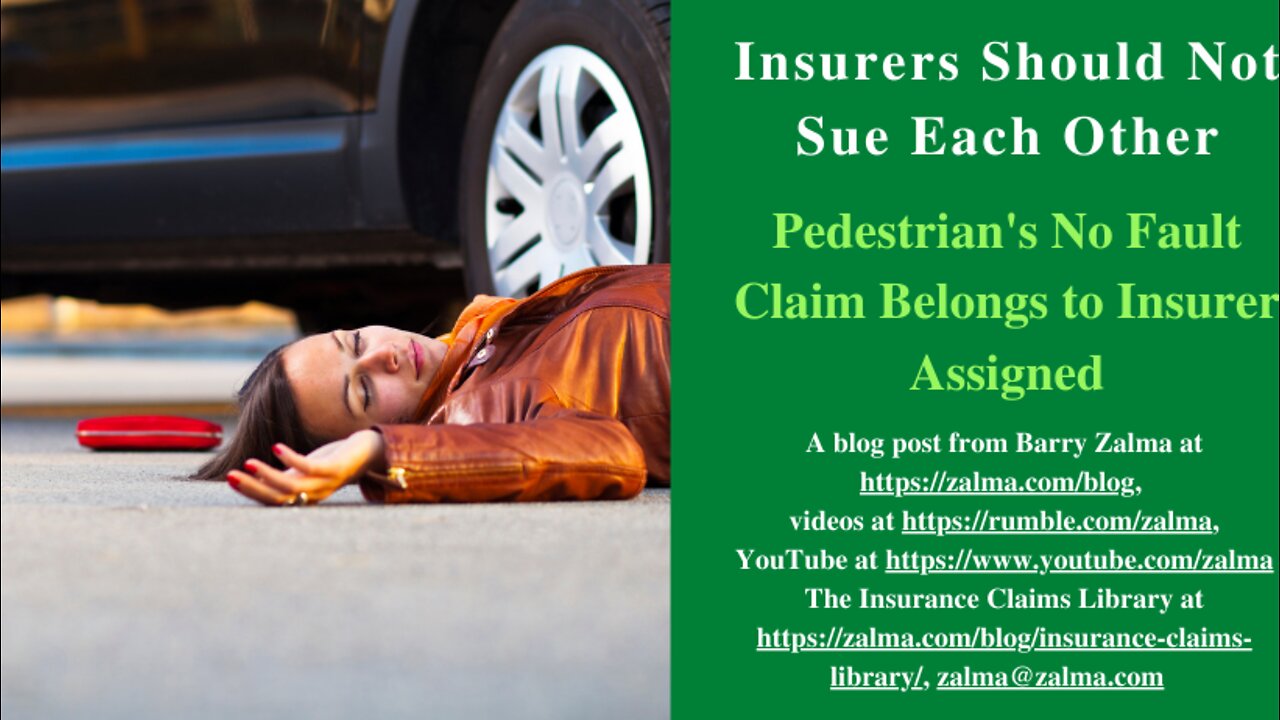Premium Only Content

Insurers Should Not Sue Each Other
Pedestrian's No Fault Claim Belongs to Insurer Assigned
Insurers are professional litigants. They are sued and sue often. Usually they avoid suing other insurer for fear of making precedents that will effect the entire industry. In Beth Bracy, Plaintiff, and ZMC Pharmacy, LLC, Riverview Macomb Home & Attendant Care, and Michigan Spine and Pain, Intervening Plaintiffs v. Yolanda Yvette Nichols, Defendant, and Farmers Insurance Exchange, Defendant/Cross-Plaintiff-Appellant, and GEICO Indemnity Company, Defendant/Cross-Defendant-Appellee, No. 359397, Court of Appeals of Michigan (October 13, 2022) the insurers involved should have avoided the litigation against each other and voluntarily resolved the dispute with the injured.
FACTUAL BACKGROUND
On March 7, 2012, Geico issued an automobile insurance policy to Marcus Nichols (Marcus). Three years later, Marcus added a 1993 Chevrolet Lumina owned by his mother, defendant, Yolanda Nichols (Nichols), to the policy. Nichols was identified as a driver on the policy, but she was not a named insured on the policy. Nichols was driving the Lumina when she was involved in an automobile accident with plaintiff, Beth Bracy, a pedestrian, on August 23, 2014. Bracy sought personal protection insurance (PIP) benefits under the Michigan no-fault act, MCL 500.3101 et seq., through the Michigan Assigned Claims Plan (MACP). MACP assigned the claim to Farmers, and Farmers paid Bracy PIP benefits for her accident-related injuries.
Bracy filed a complaint against Farmers and Nichols, alleging bodily injury liability against Nichols, and alleging Farmers had unreasonably and unlawfully refused to pay her PIP benefits in accordance with the no-fault act. Farmers filed a third-party complaint against Geico for reimbursement under MCL 500.3172. Later, Farmers sought summary disposition against Geico, contending Geico was highest in priority for Bracy's benefits. Geico also filed a motion for summary disposition against Farmers, arguing that Farmers was highest in priority for Bracy's benefits. The trial court granted Farmers' motion.
Geico appealed to the Michigan Court of Appeal which remanded to the trial court for entry of an order granting summary disposition in favor of Geico "because GEICO was not the insurer of the owner, registrant, or operator of the Lumina and, therefore, had no obligation to pay Bracy's PIP benefits under MCL 500.3115(1)."
NO-FAULT COVERAGE
Farmers contended that Nichols' vehicle was insured under Marcus's Geico automobile insurance policy, and thus, Bracy was entitled to recover no-fault benefits under that policy.
LAW AND ANALYSIS
An uninsured pedestrian who suffers accidental bodily injury must seek PIP benefits from insurers in the following order of priority:
(a) Insurers of owners or registrants of motor vehicles involved in the accident.
(b) Insurers of operators of motor vehicles involved in the accident.
When no such insurer exists, the uninsured pedestrian may seek PIP benefits through the MACP.
In this case, the trial court did not err in granting summary disposition to Geico because Geico is not the insurer of the owner, registrant, or operator of the Lumina, and therefore, was not obligated to pay Bracy's PIP benefits under MCL 500.3115(1).
In this case, it is undisputed that Marcus was neither the owner nor registrant of the Lumina; thus, the Lumina was not an auto for which he was "required to maintain security under Chapter 31 of the Michigan Insurance Code[.]" Accordingly, Bracy was not an "eligible injured person" under the terms of the Geico policy.
The named insured must have an "insurable interest” to support the existence of a valid policy. An insurable interest in property is broadly defined as being present when the person has an interest in property, as to the existence of which the person will gain benefits, or as to the destruction of which the person will suffer loss.
Marcus had no insurable interest in the Lumina because the Lumina was solely owned and operated by Nichols. And there was neither evidence that Marcus had use of the Lumina such as to be considered an owner under MCL 500.3101, nor that he intended to acquire the vehicle. The Lumina's existence did not afford Marcus any benefits, and the destruction of the Lumina would not have caused him any loss.
Geico argued that the trial court's grant of summary disposition in its favor was also proper because the insurance policy was void in light of Marcus's misrepresentations in obtaining that policy for a vehicle in which he had no insurable interest.
The trial court dismissed Geico's misrepresentation argument as moot because it was granting Geico's motion for summary disposition "on the basis of priority” The argument remains moot on appeal for the same reason.
As a general rule, an appellate court will not decide moot issues.
ZALMA OPINION
Why this litigation between insurers took place is difficult to comprehend. Farmers was assigned by the state under the MCAP to provide benefits to the injured pedestrian and it did so, as assigned. Then it claimed Geico was obligated to pay the benefits even though it did not have an obligation to do so and the trial court and Court of Appeal agreed. The lawyers fees and time of the court could have easily avoided by the two insurers working together to resolve their differences, especially after they lost twice.
(c) 2022 Barry Zalma & ClaimSchool, Inc.
Barry Zalma, Esq., CFE, now limits his practice to service as an insurance consultant specializing in insurance coverage, insurance claims handling, insurance bad faith and insurance fraud almost equally for insurers and policyholders. He practiced law in California for more than 44 years as an insurance coverage and claims handling lawyer and more than 54 years in the insurance business. He is available at http://www.zalma.com and zalma@zalma.com.Subscribe and receive videos limited to subscribers of Excellence in Claims Handling at locals.com https://zalmaoninsurance.locals.com/subscribe.Subscribe to Excellence in Claims Handling at https://barryzalma.substack.com/welcome.
Now available Barry Zalma’s newest book, The Tort of Bad Faith, and “How to Acquire, Understand, and Make a Successful Claim on a Commercial Property Insurance Policy: Information Needed for Individuals and Insurance Pros to Deal With Commercial Property Insurance” the New Books are now available as a Kindle book here, paperback here and as a hardcover here available at amazon.com.
Write to Mr. Zalma at zalma@zalma.com; http://www.zalma.com; http://zalma.com/blog; daily articles are published at https://zalma.substack.com. Go to the podcast Zalma On Insurance at https://anchor.fm/barry-zalma; Follow Mr. Zalma on Twitter at https://twitter.com/bzalma; Go to Barry Zalma videos at Rumble.com at https://rumble.com/c/c-262921; Go to Barry Zalma on YouTube- https://www.youtube.com/channel/UCysiZklEtxZsSF9DfC0Expg; Go to the Insurance Claims Library – https://zalma.com/blog/insurance-claims-library
-
 8:57
8:57
Barry Zalma, Inc. on Insurance Law
1 year agoNo Coverage for Benefits no Right to Bad Faith Damages
191 -
 25:09
25:09
MYLUNCHBREAK CHANNEL PAGE
7 hours agoOff Limits to the Public - Pt 2
12.7K9 -
 1:36:11
1:36:11
Tucker Carlson
1 day agoSean Davis: Trump Shooting Update, & the Real Reason Congress Refuses to Investigate
291K357 -
 5:13
5:13
Russell Brand
2 days agoHost GRILLS Pzizer CEO Over Vaccine Efficacy
81.7K207 -
 14:53
14:53
Stephen Gardner
3 hours ago🔥Alex Jones WARNS Trump not to DEFAULT on THIS!!
21.1K60 -
 31:54
31:54
The Why Files
5 days agoThe Quantum Apocalypse: All Your Secrets Revealed
57.2K58 -
 LIVE
LIVE
Sgt Wilky Plays
6 hours agoSaturday Hangout and Games
234 watching -
 LIVE
LIVE
DeadMan88
7 hours agoWGT Golf Road to Master
61 watching -
 1:35:04
1:35:04
Winston Marshall
2 days ago“This Wasn’t Accidental!” Maajid Nawaz SPEAKS OUT on R*PE Gangs and The REAL Cover-Up
95.9K58 -
 23:46
23:46
barstoolsports
8 hours agoSurviving Barstool Drama Spills Over Into The Office | Stool Scenes
66K3